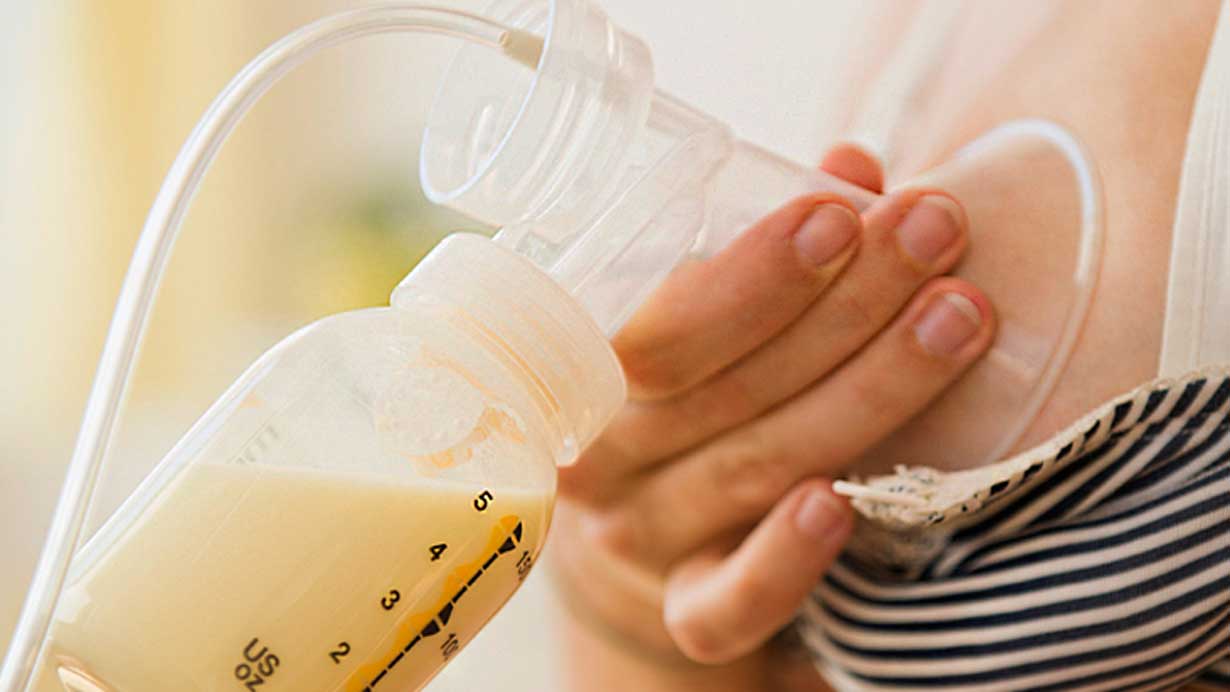
Nkechi Idinmachi is a breastfeeding mum who has two sons who were breastfed exclusively for six months.
“For my first child, the hospital where I gave birth to him abroad was pro breastfeeding and they helped me to start off well. My son was in the NICU and not able to latch properly so they gave me a hospital grade breast pump and loads of storage containers.
“They also educated me on how to increase and sustain my breast milk supply. I was expressing milk from my breasts every two hours, round the clock, even at midnight. It means that I was barely getting enough sleep, but seeing my son in that NICU I just wanted to do my bit to ensure he’s well nurtured.
“After the first two months of expressing, washing bottles and bottle-feeding repeatedly, I decided to try nursing again. The first few weeks, I experienced pain like I had never experienced in my life because my child wasn’t latching well but I persevered and eventually learned how to help him latch well,” Idinmachi recalled.
Nigeria has about 17 per cent of its children younger than six months, who are being exclusively breastfed, hence the nation celebrates the World Breastfeeding Week (WBW), a global campaign that promotes breastfeeding for physical and mental wellbeing of children.
Since 1992, the WBW has been celebrated yearly from August 1 to 7. The theme for this year’s celebration is “Step up for breastfeeding; Educate and Support.” It aims at speeding up support for breastfeeding, which provides valuable health benefits to both mothers and babies. It is also a time to educate people, especially women, about the importance of breastfeeding and provide information and resources to help nursing mothers to breastfeed successfully.
Idinmachi, however, noted that breastfeeding her second son came with a challenge that made her to quickly resort to feeding him with formula a few days after birth. “But a nurse told me that if I really wanted to breastfeed, I should stop the formula and focus on building my breast milk supply by breastfeeding more consistently whether or not I feel that my child is getting enough of the milk from my breasts. I took her advice and today, I am glad that I did because my boys gained immensely from breastfeeding,” she said.
Benefits Of Breastfeeding
According to World Health Organisation (WHO), breastfeeding is one of the most effective ways to ensure that a child is healthy and survives. Breast milk is the ideal food for infants. It is safe, clean and contains antibodies, which help protect against many common childhood illnesses. Breast milk provides all the energy and nutrients that the infant needs early in life, and it continues to provide up to half or more of a child’s nutritional needs till the second half of the first year, and up to one third during the second year of life.
Nursing mothers also benefit from breastfeeding their babies. It produces the naturally soothing hormones oxytocin and prolactin that promote stress reduction, contract the uterus back to its pre-pregnancy size. It reduces mother’s risk of developing osteoporosis, reduces her breast cancer risk and also risk of ovarian cancer. It as well
lowers her chance of developing postpartum depression, since breastfeeding enables pregnancy hormones to decrease slowly, instead of abruptly. In some women, it serves as natural birth control method as their chances of getting pregnant while breastfeeding are slim.
But most times, the milk from the mother is barely enough for her baby, hence most mothers resort to formula and water to ensure that their babies survive. This challenge has led to the idea of human milk banks in some advanced countries and has become an essential part of the healthcare system. Since breast milk is the most important food for the survival of a child, if a mother cannot produce enough to feed her baby, the human milk bank comes to the rescue.
Human milk banking has become an essential component of breastfeeding, giving pre-term, low birth weight, and other vulnerable infants access to the multiple benefits of breast milk which their mothers could not produce or could only produce in small volume.
In Nigeria, there is no human milk bank, a crucial reason there is high neonatal mortality. Some mothers have however expressed their concerns about receiving donor milk for their babies
Mothers share concerns about human milk bank
Idinmachi said: “I think it’s a good idea. Breast milk holds lots of nutritional benefits for children and I know that there are mums who really want to breastfeed but cannot due to many reasons. If there’s an organisation that would run a human milk bank ethically, following all food safety precautions, then it’s great.
“However, I know that one of the benefits of breastfeeding is that the milk composition changes when the baby is ill. The lactation experts say that as a breastfeeding mother, when you’re exposed to a bacterial or viral infection, your body makes antibodies to combat it; these are then transferred to your baby through your milk. Also, the amount of immune-boosting cells, called leukocytes, in your milk will increase rapidly whenever your baby is unwell. I’m not sure how these would work if the baby is not being nursed.” She expressed willingness to donate breast milk if the need arises.
“I pray that I don’t get to the point where I’m not able to breastfeed my child, but if it comes to that, I’ll prefer that my child is nursed by the donor instead. I think if mothers are educated about the benefits of breastfeeding, the techniques and given six months leave, at least, they would breastfeed. But you find that hospitals barely provide any postpartum care for mothers to teach and support their journey.”
Another mother, Ugochi Anyamele believes that breastfeeding creates a bond between her and her baby. “It is comfortable and cheap for me. I enjoy every bit of breastfeeding because I know my son is feeding healthy.”
She said: “Human milk bank and donating milk sound strange here, it is not applicable in Nigeria. But I will be willing to donate my breast milk, though I am not sure I want to receive from a human milk bank if there is any. I encourage breastfeeding any day.”
Salem Favour, who is currently breastfeeding her five months old son, described breastfeeding as amazing. “I am exclusively breastfeeding, I only pray for the strength to carry on this assignment.”
She said donor milk would be of immense benefits to those who cannot produce enough milk to nurse their babies. “I may donate, not too sure, but I am definitely not sure of getting some from a human milk bank. I will do everything possible to ensure I get enough milk for my baby.”
Men react
Paul Olisa’s wife is currently nursing their two-month old daughter, Zara who sucks a lot. “Her mother hardly satisfy her needs, so donating milk to a bank is not an option. Breast milk is her best bet, best friend and life saver. I also wouldn’t want my baby to be fed with breast milk from any bank. I would rather go for baby formulas that I am at least sure of.”
According to Mr. Samuel Ofeh, some women face difficulties with lactation usually immediately after giving birth to a baby. “I believe the excess milk from another nursing mother’s breasts can be expressed to help fix such difficulties. I call it effective redistribution of breast milk. My wife is currently breastfeeding our baby and I prefer it directly from her breasts. I will also encourage her to donate to a bank if need be.”
Godwin Iheme, a legal practitioner who described himself as an advocate of exclusive breastfeeding said: “I ensure that my wife breastfeeds for at least one year and at most 18 months. I prefer my child sucking directly from the mother’s breasts; I don’t like the idea of moving milk into bottles. I am also not willing to donate or receive breast milk; it is not just a part of us.
Experts Speak
A medical doctor and UK Lactation Consultant, Chinenye Obinwanne-Ezewike said there are challenges a mother faces while breastfeeding.
“It could be the mother’s nipple size or the baby’s mouth size being too small, or maybe the baby was born with some issues and was taken away from the mother early.
“Every woman can breastfeed, even men can be made to produce breast milk. I work with surrogate mothers who did not carry the pregnancy themselves, I put them through the process and they’re able to produce breast milk. It is the same thing with the gay community, outside Nigeria. You find men, through what is called Chest feeding, they go through a plan, which induces breast milk and they will start producing breast milk. So, every woman can breastfeed, except for some reasons your breasts have been chopped off and the producing gland is not there.
“However, there is a small percentage of women who, during puberty, their breasts were not developing properly in terms of the breast milk producing gland. Those women, you wouldn’t say they cannot breastfeed, but they can’t produce the volume required to engage in exclusive breastfeeding. The small-volume producers constitute about five per cent of women in the whole wide world. It is a very small fraction of women and these women know that for some reasons, they do feel a bit different, compared to other people.”
Obinwanne-Ezewike, who is the founder of the MilkBooster, quoted the WHO as saying that breast milk, at birth, is the first option for the baby, a second option is the breast milk baby gets when a mother has expressed and given it to the baby, while a third option is the breast milk a baby gets from a donor milk bank.
“These are the three options before considering a partially hydrolised milk formula. This means it is not all formulas that babies should be getting. Some people jump from a mum not producing milk straight to mum getting formula without considering the options. When a mum comes to a healthcare practitioner and says she is not producing enough milk, the first thing is to understand why she is not producing enough, refer the mum to a lactation expert that can provide solution, try to boost her supply, and if it is still not forthcoming, then we access milk from donor milk bank.”
She noted that Nigeria has over 700, 000 babies born prematurely every year and 65 per cent of them end of dying before they turn five. “This is because they are not getting breast milk, many of them are given formula that have been produced specifically for preemie babies. Remember that this formula is processed cow milk, while the donor bank is processed human milk, so these babies technically are better off getting a processed human milk than a process cow milk.”
Studies have shown that premature babies in NICU do much better when they get donor breast milk. They get discharged earlier in the hospital. Human milk intake for premature babies reduces risk of Necrotizing Enterocolitis (NEC), a condition that affects their guts and could cause a lot of them to die. Formula does not protect them. Studies have also shown that these risk factors in preemie babies are reduced when they get donor breast milk. That is why, around the world, the WHO is pushing for human milk bank. Sadly, in a nation like Nigeria with over 700, 000 preemie, we don’t have a human milk bank up till now.”
Certified Lactation Consultant and Economist, Titi Medunoye says breast milk remains the most nutritious food for baby. “It is recommended that a baby be fed only breast milk for 0 – six months of life and should even continue to add breast milk to their diets till the age of two years. Breast milk is filed with antibodies that help your baby fight viruses and bacteria, which is very important for them. It reduces your baby’s risk of many illnesses and diseases such as intestinal tissue damage, ear infection, respiratory tract infection, cold and allergies,” Medunoye said.
On breast milk storage methods, Medunoye who is the founder of Milky Express, believe that that women are aware of the various options but are faced with infrastructural problems like poor electricity.
“Breast milk can be stored for up to a year as long as it is frozen solid. It does not spoil and does not loose its nutrient. Where there is no electricity, breast milk can be stored in a cooler with iced blocks for a day or two as long as the ice is still present.”
For working mothers, a peculiar challenge is the short maternity time. “In Nigeria, it is quite a herculean task to expect mothers to breastfeed exclusively for six months when they are only entitled to three months maternity leave. Organisations need to show support for new mothers in this regard and policy makers need to step in to ensure organisations adhere to policy for maternity care.
“Another challenge they face is the lack of nursery or privacy in the workplace. For a working mother to effectively breastfeed, she has to be able to pump or express milk while at work. This is not just important food for the baby, it is also very important to ensure the mother does not get engorged which could lead to other illnesses such as mastitis. Getting a place to store breast milk while at work is also a problem. Breastfeeding can be easier for working mums if organisations prioritise supporting new mums.”
Milk bank in Nigeria
Obinwanne–Ezewike said the idea of a milk bank came about a couple of years ago. “A Nigerian mum had triplets and there were massive messages on social media. People came to my DM asking if I had donor milk. That was the first time I saw the need for donor milk in Nigeria. At the end of the day, that mum didn’t get and she lost two of those babies. Another time, it was a surrogate mother. She had four babies, she couldn’t also get donor milk and she lost all of them. This being delayed up until now has left room for neonatal mortality rate to rise in Nigeria,” she lamented.
According to her, it is a community-based human milk bank that can supply to as many hospitals as possible. “Regarding milk donation, I have done a lot of research, engaged mother with questionnaires and what I have seen so far is that Nigerian mums who can produce their breast milk are very happy to donate but are not willing to receive. So we will reach out to those who come to us who are in need. They ask if we sell breast milk, we don’t sell breast milk, there is only a service fee for the process it takes.
“Before now, we have engaged in informal method of donor milk; a mum comes crying about her child’s inability to get milk and we connect her with a mother who has milk, it hurts me that we engaged in informal sharing. Now we can make it better where we process donor milk from mums who have excess, pasterise it, screen the mother and the milk and then get them across to the premature babies who need them urgently.”
According to Medunoye, the presence of milk bank will help solve the crises of malnutrition in babies and children because this means that undernourished children or children whose mothers are absent can enjoy the nutrients of breast milk. Running a milk bank is something that is very doable. The greatest challenge to this is lack of constant electricity supply. I believe that if more families are able to understand the importance of breast milk, it will be easy for them to easily accept donated human milk just the way they would accept donated human blood.
Activities of lactation experts encouraging breastfeeding
For Medunoye, one of the main things that can help a breastfeeding mother is the support from the people. “We do not help her breastfeed, but we can help take other non-important chores off her so she can focus on her recovery, and caring for herself and her baby. Maintaining optimum nutrition too is very important for breastfeeding mothers.
“It is not about the quantity of food you eat but how nutrient-dense the food is. It is important for a breastfeeding mother to be very hydrated. Breast milk requires a lot of water intake to produce and maintain the milk supply. Get support from experts. There are board certified lactation consultants who are clinically trained to manage breastfeeding and human lactation.”
Obinwanne–Ezewike noted that as lactation experts, they focus on nutrient- dense with components like oats, sesame seeds and flaxseed to make products that mums would enjoy in form of cookies, granola, smoothie and hot chocolate drinks. “They are satisfied when they realise that their babies sleep for long, gain weight and are satisfied.
“While women are prepared for labour and childbirth that takes a maximum of 48 hours, there is no adequate knowledge on breastfeeding that takes almost two years. Hence, there is always a knowledge gap. Because most organisations do not have facilities like crèches or pumping room to aid adequate breastfeeding and nursing a baby, we have come up with wearable rechargeable pumping bras. The mum goes around with it pumping. That way, she is maintaining demand and her baby will be nourished.
“Mothers should also know that when their baby gets to six months, it doesn’t bid goodbye to breast milk. It is still the optimal meal for your baby for the first one year,” Obinwanne–Ezewike added.






